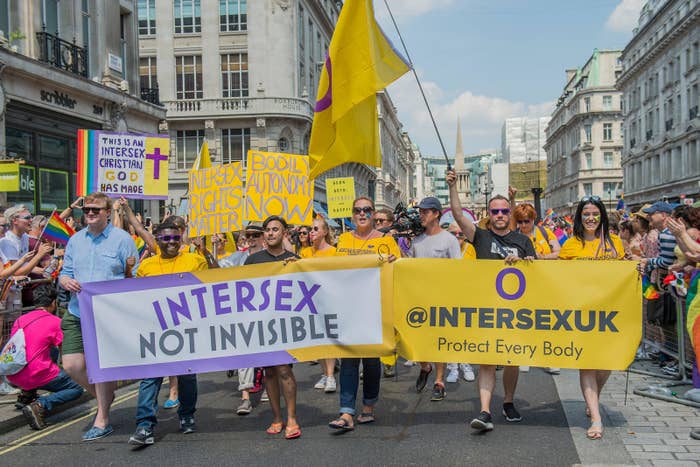
The British government is preparing to launch a consultation next year into the treatment, rights, and experiences of intersex people, BuzzFeed News can reveal.
Meetings are underway between the government’s equalities office and those involved in the care of intersex people after the department issued a “call for evidence” into the areas that require further investigation.
Intersex is an umbrella term for people whose bodies do not align physically with standard notions of either male or female. This can relate to genitals, reproductive organs, sex chromosomes, or sex hormones, and is distinct from being transgender, which relates to gender identity.
There are widespread concerns among intersex organisations about the way that laws, human rights, and the medical profession treat intersex children and adults.
Among these concerns is the practice of doctors performing surgery on infants to modify genitals, particularly in cases where there is no clinical need to do so, and when no informed consent has been obtained from the child.
In 2017, researchers into intersex experiences at the University of Huddersfield called for an overhaul of the medical response. “Support and training for medics — including about sex diversity issues — is required,” said the report’s authors. “The severe, harmful effects reported as a result of early childhood interventions need to be acknowledged.”
Such operations, the study found, are generally an attempt to make genitals conform to traditional ideas of how male or female sex organs should look. A young intersex man called Anick told BuzzFeed News in 2017 that after doctors realised he was intersex, and after years of surgeries, “Nothing was explained to me, so at a young age I didn’t know what was going on — you feel fine but you are at the hospital.”
Surgery on intersex children carries risks, and critics say the surgery assumes how an individual child will feel later in life. Mistakes can therefore be made, forcing children into a sex contrary to their gender identity and sense of self.
A range of medical interventions that draw criticism from intersex advocates will be examined during the government’s consultation.
Holly Greenberry from IntersexUK told BuzzFeed News: “Young people must be afforded the basic human right to decide autonomously how they would like their body to feel and function. A child needs to be able to live healthily, happily and safely and not subject to harmful practice, sterilisations, sex assignments and other harmful practices which typically infringe horrendously on the quality of their childhood.”
For doctors to “guess” what the gender of the child should be and give hormones or perform surgery “by means of irreversible procedures without that person’s consent is barbaric”, Greenberry added.

Intersex groups also point to an absence of standardised care and treatment in the medical response to such patients. Some are also concerned that abortions are being carried out where intersex variations are spotted prenatally.
The consultation, BuzzFeed News understands, will examine a broad range of areas across the experiences faced by intersex people, including the impact of stigma, surgery, and discrimination.
Greenberry said the plans to examine the issues more closely through a consultation was much needed, and vowed to help wherever possible.
“IntersexUK (iUK) has always welcomed opportunities to work with varying national government departments,” she said. “To date iUK and advocates supporting them are making positive inroads in supporting some departments and policy makers to thoroughly examine Intersex/Variation of Sex Characteristic experiences, needs and demands.”
She also highlighted some of the social issues requiring attention and the extra support that is needed.
“It’s essential that families are not judged and kids with intersex/Variation of sex characteristic bodies are not labelled, and are treated fairly and respectfully in schools, social environments and by medics,” she said. “Signposting to intersex organisations by medics is essential and funding for peer support is vital. Intersex/VSC bodied people and young people’s families typically state that they aren’t offered any appropriate signposting, and finding support like iUK is offering was so difficult.”
Along with the term intersex, the government is expected to emphasise the phrase “variation of sex characteristics (VSC)”, which is preferred by some. Many intersex people also prefer not to refer to any differences as “conditions”, because they often do not pose any medical problems and are, instead, a healthy variation.
There is no definitive data on how many people there are with intersex variations, only estimates that generally range from about 0.5% to 2% of the population, depending on which differences are included.
There is also a lack of agreement about what constitutes intersex variations. Doctors, for example, can deem hypospadias (in which the opening of the urethra on a penis is not at the end but further down) as an intersex variation when in conjunction with other differences, whereas some patients do not.
Most of the population is never subject to tests or examinations that might find physical traits, such as chromosomes or internal reproductive organs, that diverge from their perceived sex. Those who discover an intersex variation sometimes do so later in life when trying to conceive children, for example.
This month, 1,600 scientists signed a letter refuting the suggestion in a memo from the US Department of Health and Human Services that sex has a “biological basis that is clear” and as such can be easily tested using genetic testing. Instead, the signatories said, “many factors, known and unknown, mediate the complex links between identity, genes and anatomy.”
Specialists in the field tend to agree that sex is not a biological binary, male or female, but a complex set of physical, hormonal, and chromosomal traits. A baby with a penis, for example, might be deemed male but can have ovaries and XX or XXY chromosomes. This may or may not be discovered but would likely constitute an intersex variation.
The UK government’s decision to prepare for a consultation follows considerable controversy over its consultation on the Gender Recognition Act, which ended last month. But the intersex consultation, which is entirely separate and concerned with different issues, is not expected to receive such a response.
When approached by BuzzFeed News, a spokesperson for the government’s equalities office declined to comment specifically on the intersex consultation, instead referring to the promise made by the government in its LGBT Action Plan earlier this year to “improve our understanding of the issues faced by people who identify as non-binary and people who are intersex… We will launch separate Calls for Evidence on the issues faced by non-binary and intersex people.”
